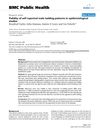TLDR No clear link between androgen receptor variation and hair loss, but more research needed.
This document is a summary of four different studies that investigated the potential relationship between androgen receptor copy number variation (CNV) and androgenetic alopecia (AGA). The first study found no evidence of CNV in the AR gene in any of the cases or controls, suggesting no significant association between AGA and AR CNV. The second study also found no evidence of CNV in the regions of the AR that were examined. The third study found no evidence of AR CNV in DNA derived from lymphocytes, but could not rule out CNV around the AR in DNA contained in the cells of the hair follicles themselves. The fourth study found a significant association between AR gene CNV and AGA, suggesting that AR gene CNV may play a role in the development of AGA.
 60 citations
,
January 2007 in “Human Genetics”
60 citations
,
January 2007 in “Human Genetics” AR polyglycine repeat doesn't cause baldness.
 195 citations
,
June 2005 in “American Journal of Human Genetics”
195 citations
,
June 2005 in “American Journal of Human Genetics” Genetic variation in the androgen receptor gene mainly causes early-onset hair loss, with maternal inheritance playing a key role.
 76 citations
,
April 2005 in “Cancer Epidemiology, Biomarkers & Prevention”
76 citations
,
April 2005 in “Cancer Epidemiology, Biomarkers & Prevention” E211 G>A gene linked to lower risk of severe prostate cancer and hair loss.
 32 citations
,
December 2004 in “BMC Public Health”
32 citations
,
December 2004 in “BMC Public Health” Men can report their own balding patterns well enough for large health studies.
299 citations
,
March 2001 in “Journal of Investigative Dermatology” Male pattern baldness is linked to specific genetic variations in the androgen receptor gene.
 15 citations
,
June 2020 in “Experimental Dermatology”
15 citations
,
June 2020 in “Experimental Dermatology” Hormones and genes affect hair growth and male baldness.
 87 citations
,
March 2011 in “Australasian Journal of Dermatology”
87 citations
,
March 2011 in “Australasian Journal of Dermatology” Genetics and hormones play a role in male and female hair loss, but more research is needed to fully understand it.
 3 citations
,
December 2018 in “Meta Gene”
3 citations
,
December 2018 in “Meta Gene” Certain gene variations increase male hair loss risk, influenced by hormone levels.
 153 citations
,
March 2017 in “Endocrine”
153 citations
,
March 2017 in “Endocrine” Male pattern baldness involves genetics, hormones, and needs better treatments.
 September 2023 in “Nature Communications”
September 2023 in “Nature Communications” Rare genetic variants in five specific genes are linked to male-pattern hair loss but only account for a small part of the risk.









